"The selection of case studies featured in Catanese’s edited volume solidify the canon of Futurist film; this book is destined to become a go-to for anyone discussing the movement in the context of cinema." - Malgorzata Bugaj (University of Edinburgh), NECSUS Journal, May 2020
"Futurist Cinema draws materials from different disciplines, reflecting the "poly-expressiveness" of the movement, through the lense of media theory, sensorial perception, national culture, movie narrative, dance performance, and various other fields. It is a multi-dimensional scanning of the few films produced or only scripted and what they represent." - Neural magazine, July 2019
"This groundbreaking interdisciplinary book brings together scholars of avant-garde Italian futurism of the 1910s and 1920s to offer insights on Italian futurist cinema and its cinematic production. The methodological approaches span film and media studies, film theory and literary criticism, cultural and gender studies, and visual and performing art studies. The contributors offer unique perspectives on this early-20th-century avant-garde movement, demonstrating that it influenced not only other movements, such as Soviet futurism, but also visual arts, literature, and dance. Thanks to the different approaches, what emerges from this scholarly work is the notion that futurist cinema can be understood only by engaging it in a theoretical framework that takes into consideration all the diverse possibilities of the arts. In the second part of the book some important futurist films are analyzed through close readings, adding filmic analysis to the more critical and theoretical first part. Part 3 comprises a chronology of futurism and a filmography, both crucial to the book."
Summing Up: Recommended. Graduate students, researchers, faculty. - C. De Santi, Farmingdale State College SUNY, Choice Reviews
"Futurist Cinema, La naissance du cinéma moderne, Pierre Pageau. SÉQUENCES, Decemeber 2018

